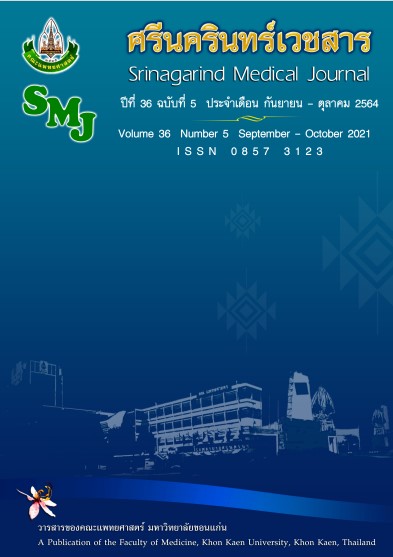ผลป้องกันทางระบบประสาทของกรดคาเฟอิคต่อความบกพร่องของความจำที่ถูกเหนี่ยวนำด้วยแอล-เมไธโอนีนในหนูแรทโตเต็มวัย
Abstract
The Neuroprotective Effect of Caffeic Acid against L-Methionine Induced Memory Deficits in Adult Rats
Oabnithi Dornlakorn1,2, Aurasa Saenno1,2, Tanaporn Anosri1,2, Soraya Kaewngam1,2, Nataya Sritawan1,2, Kornrawee Suwannakot1,2, Apiwat Sirichoat1,2, Wanassanan Pannangrong1, Jariya Umka Welbat1, 2*
1Department of Anatomy, Faculty of Medicine, Khon Kaen University, Khon Kaen 40002, Thailand
2Neurogenesis Research Group, Khon Kaen University, Khon Kaen 40002, Thailand
*Corresponding author: Jariya Umka Welbat, Department of Anatomy, Faculty of Medicine, Khon Kaen University, Khon Kaen 40002, Thailand. E-mail: jariya@kku.ac.th
หลักการและเหตุผล: แอล-เมไธโอนีนพบในผลิตภัณฑ์ธรรมชาติเช่น เนื้อ นม และธัญพืช แอล-เมไธโอนีนเป็นกรดอมิโนและสามารถถูกเปลี่ยนไปเป็นสารโฮโมซิสเทอีนโดยการเพิ่มกลุ่มเมทิล การสะสมของโฮโมซิสเทอีนที่มากเกินเป็นสาเหตุของของภาวะไฮเปอร์โฮโมซิสเทอีน และนำไปสู่ภาวะความจำบกพร่อง กรดคาเฟอิคเป็นสารประกอบฟีโนลิกและพบในกาแฟและชา การศึกษาก่อนหน้าได้รายงานผลป้องกันทางระบบประสาทของกรดคาเฟอิคต่อความจำที่เสื่อมลง ดังนั้นการศึกษาครั้งนี้จึงมีวัตถุประสงค์เพื่อศึกษาผลของกรดคาเฟอิคในการป้องกันความบกพร่องของความจำต่อการเหนี่ยวนำของแอลเมไธโอนีน
วิธีการศึกษา: หนูแรท เพศผู้สายพันธุ์ Sprague Dawley จํานวน 60 ตัว ถูกแบ่งออกเป็น 6 กลุ่ม ได้แก่ control, L-met, caffeic acid 20, caffeic acid 40, caffeic acid 20+L-met และ caffeic acid 40+L-met โดยกลุ่ม control ได้รับโพรพิลีนไกลคอลและสารละลายเซลลูโลส โดยการป้อน ในกลุ่ม L-met, caffeic acid 20, caffeic acid 40, caffeic acid 20+L-met และ caffeic acid 40+L-met ได้รับกรดคาเฟอิค (20 และ 40 มิลลิกรัม/กิโลกรัม) และแอล-เมไธโอนีน (1.7 กรัม/กิโลกรัม) โดยการป้อน เป็นเวลา 28 วัน วันละ 1 ครั้ง การเปลี่ยนแปลงน้ำหนักและการเคลื่อนไหว นอกจากนั้นความจำความจำเกี่ยวกับพื้นที่และความจำโดยรู้จำถูกตรวจโดยใช้การทดสอบ novel object location (NOL) และ novel object recognition (NOR) ถูกตรวจสอบตามลำดับ
ผลการศึกษา: ผลลัพธ์แสดงว่ากลุ่มที่ได้รับกรดคาเฟอิค (20 และ 40 มิลลิกรัม) และแอล-เมไธโอนีนไม่มีผลด้านลบต่อน้ำหนักตัวและเกี่ยวกับการเคลื่อนที่ ความบกพร่องของความจำเกี่ยวกับพื้นที่และความจำโดยรู้จำพบในกลุ่มแอล-เมไธโอนีน แต่ไม่พบในกลุ่มอื่น
สรุป: การศึกษาครั้งนี้พบว่ากรดคาเฟอิค (20 และ 40 มิลลิกรัม) สามารถป้องกันภาวะความจำบกพร่องที่เหนี่ยวนำโดย แอล-เมไธโอนีนได้
คำสำคัญ: กรดคาเฟอิค, แอล-เมไธโอนีน, ความจำบกพร่อง
Background and objective: L-methionine is found in natural products such as meat, milk and cereal grain. It is a non-essential amino acid and can be changed to homocysteine by methylation. Excess accumulation of homocysteine is a course of hyperhomocysteinemia and leads to memory deficit. Caffeic acid is a phenolic compound found in coffee and tea. Previous studies reported the neuroprotective effect of caffeic acid on memory and cognitive functions. Therefore, this study aimed to determine the neuroprotective effect of caffeic acid against L-methionine induced memory deficit.
Methods: Sixty male Sprague-Dawley rats were divided into 6 groups: control, L-met, caffeic acid 20, caffeic acid 40, caffeic acid 20+L-met, caffeic acid 40+L-met groups. The control group received propylene glycol and carboxymethyl cellulose by oral gavage once a day for 28 hours. The caffeic acid 20, caffeic acid 40, caffeic acid 20+L-met, caffeic acid 40+L-met groups, caffeic acid (20 and 40 mg/kg) and L-methionine (1.7 g/kg) groups were administered by oral gavage once a day for 28 days. Changes of body weight and locomotor activity were examined. Moreover, spatial and recognition memory were determined using the novel object location (NOL) and novel object recognition (NOR) tests, respectively.
Results: The results demonstrated that caffeic acid (20 and 40 mg) and L-methionine did not have a negative effect on the body weight and locomotor activity. Impairments of spatial and recognition memories were found in the L-met group, but was not detected in the other groups
Conclusion: This study reveals that caffeic acid (20 and 40 mg) could potentially protect against L-methionine induced memory deficits.
Keywords: Caffeic acid, L-methionine, Memory impairment.


